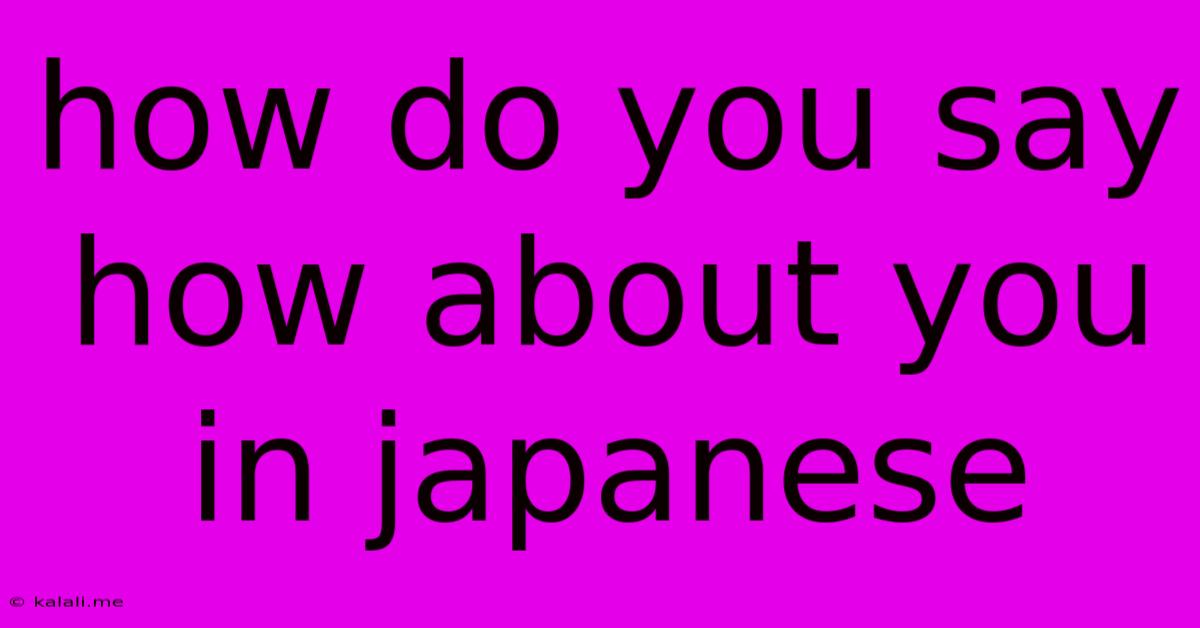How Do You Say How About You In Japanese
Kalali
May 19, 2025 · 3 min read

Table of Contents
How Do You Say "How About You?" in Japanese? A Comprehensive Guide
Finding the perfect way to ask "How about you?" in Japanese depends heavily on context. There's no single, direct translation that works flawlessly in every situation. This article will explore several options, explaining their nuances and helping you choose the most appropriate phrase for your conversation. Understanding these subtle differences will significantly improve your Japanese communication skills.
Understanding the Nuances of "How About You?"
Before diving into the Japanese phrases, let's consider the different meanings behind the English "How about you?". Are you:
- Asking for agreement or reciprocation? (e.g., "I like ramen; how about you?")
- Inviting someone to participate? (e.g., "I'm going to the park; how about you?")
- Asking about someone's opinion or experience? (e.g., "I had a great time; how about you?")
- Simply continuing a conversation? (e.g., "I'm tired; how about you?")
The Japanese language requires a more specific approach depending on the intended meaning.
Common Ways to Say "How About You?" in Japanese
Here are several ways to express "How about you?" in Japanese, categorized by context:
1. For Agreement or Reciprocation: あなたはどうですか? (Anata wa dō desu ka?)
This is a fairly direct translation and often works well. It literally means "How are you?" but in this context, it implies "And you?". It's a polite and versatile option suitable for most situations. Remember that anata (あなた) is a polite form of "you," suitable for most everyday conversations. However, for closer relationships, you might use other pronouns.
2. For Invitations or Suggestions: 〜ませんか? (〜masen ka?)
This isn't a direct translation but a highly effective way to invite someone to do something. You attach masen ka? to the verb stem of your suggestion.
- Example: 映画を見ませんか? (Eiga o mimasen ka?) - How about watching a movie? (literally: Won't you watch a movie?)
This is a polite and commonly used way to suggest activities or extend invitations. The masen ka? construction adds a gentle encouragement.
3. For Asking About Someone's Opinion or Experience: あなたは? (Anata wa?) or あなたはどうだった? (Anata wa dō datta?)
-
あなたは? (Anata wa?) This is a shorter, more casual way to ask, "And you?" It works well if you've already shared your opinion or experience.
-
あなたははどうだった? (Anata wa dō datta?) This translates to "How about you?" (referring to a past experience).
4. Informal Options: お前はどう? (Omae wa dō?)
This phrase is highly informal and should only be used with close friends or family. Omae (お前) is a very informal term for "you".
Choosing the Right Phrase
The best way to say "How about you?" in Japanese depends heavily on the context of your conversation and your relationship with the other person. Consider the situation and choose the phrase that best fits the nuance you want to convey.
Beyond the Phrases: Context is Key
Remember, mastering conversational Japanese goes beyond simply knowing the right words. Pay attention to body language, tone of voice, and the overall flow of the conversation. These factors play a significant role in effective communication. Practice using these phrases in different contexts to gain confidence and fluency. Improving your Japanese requires consistent effort and immersion in the language.
Latest Posts
Latest Posts
-
How Long Can A Thermos Keep Water Hot
May 20, 2025
-
How To Drain The Water From A Toilet
May 20, 2025
-
How To Get Oil Out Of Wood
May 20, 2025
-
What Does It Mean To Air Someone
May 20, 2025
-
I Know That I Do Not Know
May 20, 2025
Related Post
Thank you for visiting our website which covers about How Do You Say How About You In Japanese . We hope the information provided has been useful to you. Feel free to contact us if you have any questions or need further assistance. See you next time and don't miss to bookmark.